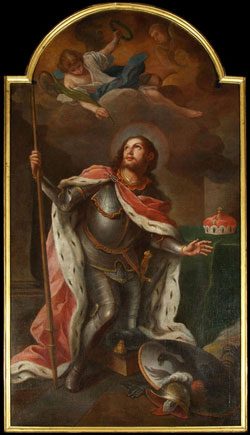
Wenceslaus or Wen·ces·las [wen-sis-laws] Examples noun
- 1361–1419, emperor of the Holy Roman Empire 1378–1400; as Wenceslaus IV, king of Bohemia 1378–1419.
- SaintGood King Wenceslaus, a.d. 903?–c935, duke of Bohemia 928–935.
German Wenzel. Examples from the Web for wenceslas Contemporary Examples of wenceslas
The international media had been waiting on Wenceslas Square since early afternoon.
How Havel Inspired the Velvet Revolution
Michael Zantovsky
December 6, 2014
Historical Examples of wenceslas
Wenceslas had meanwhile attempted to redeem his promise to Hus.
A History of Bohemian Literature
Count Ltzow
It was published by Wenceslas Hanka in 1824, and was greatly admired.
A History of Bohemian Literature
Count Ltzow
And there could be no doubt of its authenticity, coming as it did from a tool of Wenceslas himself.
Charles Francis Stocking
What that claim might accomplish if laid before Wenceslas, he shuddered to think.
Charles Francis Stocking
Then I will send these bills, or such part as we deem wise, to Wenceslas.
Charles Francis Stocking
British Dictionary definitions for wenceslas Wenceslaus Wenceslas noun
- 1361–1419, Holy Roman Emperor (1378–1400) and, as Wenceslaus IV, king of Bohemia (1378–1419)
- Saint, known as Good King Wenceslaus. ?907–929, duke of Bohemia (?925–29); patron saint of Bohemia. Feast day: Sept 28
Word Origin and History for wenceslas Wenceslas
masc. proper name, from Medieval Latin Venceslaus (modern Czech Vaclav), from Old Czech Veceslavu, literally “having greater glory,” from Slavic *vetye- “greater” + *-slavu “fame, glory,” from PIE *klou-, from root *kle- “to hear” (see listen).
 Liberal Dictionary English Dictionary
Liberal Dictionary English Dictionary